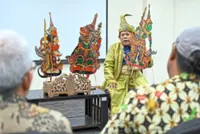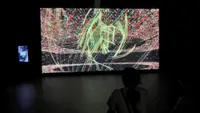Saif el Islam al Ahmed Mahmoud sat cross-legged on a sheepskin and gingerly turned the pages of an ancient manuscript.
"What would the world be without poetry?" he asked, using cotton gloves to handle the thin paper document, written in an ink concocted from charcoal and gum Arabic.





